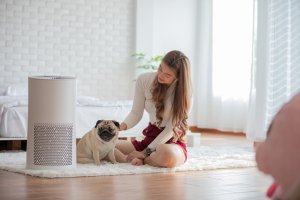It’s allergy season, which means that many people may be experiencing runny nose, sneezing, congestion and irritated, watery eyes. If you live in a modern apartment, with upgrades meant to provide you with the comfort of healthy air, then returning home is bliss. But if you live in an older apartment, it’s very probable that the heating and cooling systems may be outdated, not to mention other pollution factors, which can worsen your respiratory problems.

The United States Environmental Protection Agency has, for a long time, raised concerns over the fact that often times the indoor air quality may be more pollutant than outdoor air, especially when your apartment features a combination of factors, such as a small floor plan, poor ventilation and volatile organic compounds in excess.
Here’s how to improve the air quality in your home and control allergens:
- Keep rooms dry
Ensure that your bathroom and laundry rooms are well ventilated and dry to prevent mold and mildew; if they do not feature a fan, install a box fan.
- But not too dry
Maintain good humidity at all times and good air circulation. The normal levels should fall between 30 and 50 percent and depending on whether the air level in your apartment goes under or above those, get either a humidifier or dehumidifier.
- Fresh air?
For those suffering from allergies, it’s better to keep your windows and doors shut and use the A/C instead to reduce outdoor allergens like pollen and mold.
- Avoid VOCs
Use natural, green cleaning products and avoid synthetic air fresheners and candles
- Dust and vacuum
It may sound like common sense, but it’s always good to be reminded of this. The good ol’ dust is no stranger to any season, so a thorough dusting and vacuuming of your apartment, one or twice a week, is key to a healthy environment.
- Check air filters
Replace the filters of your heating and cooling systems regularly. Try to get filters that are certified for asthma and are allergy friendly as they can filter up to 98 percent of air allergens.
- Use air purifiers
When choosing an air purifier, decide which type of allergens you’d like to filter as devices vary.
- Indoor plants for allergy sufferers?
Yes, not all plants are bad for allergy sufferers. In fact, some types may actually filter harmful toxins, such as benzene, formaldehyde and trichloethylene, which exist in detergents and wood products. Golden pothos, philodendron, peace lily and a few types of palm (e.g., Areca, Kentia and Bamboo) are safe to have.
- Get new, allergen-resistant covers for your pillows and mattress
